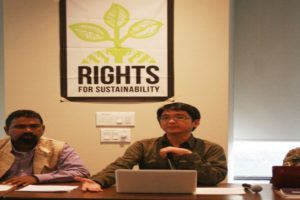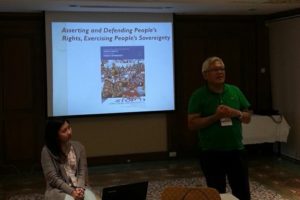RIO DE JANEIRO, June 20, 2012—International advocacy platform Rights for Sustainability (R4S) joined the “People’s March” on the “Global Day of Action” organized to mark the first day of formal negotiations by heads of states in Rio+20, the United Nations Conference on Sustainable Development, now being held in Rio de Janeiro, Brazil.
[[{“type”:”media”,”view_mode”:”media_large”,”fid”:”70″,”attributes”:{“alt”:””,”class”:”media-image”,”height”:”233″,”style”:”width: 310px; height: 233px; margin: 10px; float: right;”,”typeof”:”foaf:Image”,”width”:”310″}}]]The mobilization of some 50,000 activists from both local and international groups snaked around downtown Rio to demonstrate to heads of state—as well as the rest of the world—that people want system change for genuine sustainable development.
In a day of coordinated action, R4S delegates also protested inside the Rio Centro conference summit centre where the heads of state were gathered. They held placards bearing the R4S “five key asks”, and wore masks to show how multinational corporations from the richest countries are threatening people’s interests.
R4S head of delegation Antonio Tujan Jr said: “This is the real Rio+20 summit where real solutions and approaches to genuine sustainable development are being discussed with people’s participation—in contrast to the formal Rio+20 negotiations at Rio Centro, where the corporate “green economy” is being promoted.”
Wearing orange scarves emblazoned with “I Reject Gree(d)n Economy”, the R4S delegates called for the rejection of this corporate Green Economy agenda, declaring that this would only centralize the world’s resources further in the hands of the world’s 1%—at the expense of the remaining 99%. The Green Economy will only push people deeper into poverty, and the whole world further into crisis.
“Green economy is not simply green washing. Worse, it is the financialization of nature itself,” Tujan said.
“The proposed market reforms across the 11 economic sectors—agriculture, fisheries, water, forests, energy, manufacturing, waste, infrastructures, transportation, tourism and cities—will only provide financial investors more ways to profit.”
“We do not need this corporate Green Economy. What we need is system change that will dismantle this profit-driven economy and replace it to an economy that is founded on the rights and welfare of people.”
R4S delegate Maria Theresa Lauron also spoke on stage during the mobilization. “Green economy is not the future we want. Putting a price tag on nature violates people’s human rights. It also puts a price tag on the right to life itself—making it available only to those who can pay, Lauron said.
“We must fight for our right to live and to live well. Reject green economy!” she declared. ###


